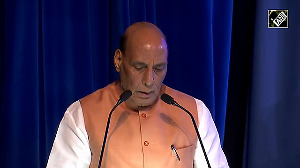"In Europe, we have a saying: 'Do not rock the boat'," says the lanky Finn, pausing for effect. "We expect work out of Tamil Nadu to gather strength without interruptions at every stage." So far, Jukka Lehtela, director of telecom giant Nokia's India operations, has had little to worry about.
But the strain of the ongoing MNC assault on Sriperumbudur - Tamil Nadu's manufacturing sweetspot - is beginning to tell.
"The cooperation extended by the Tamil Nadu government is the best thing we could have hoped for. But we need rail connectivity; there is just one highway which is already under strain from all the SEZs (Special Economic Zones) operating in the Sriperumbudur-Kancheepuram belt," says Lehtela.
Lehtela isn't the only one to recognise that Tamil Nadu's manufacturing competitiveness has doubled, with the largest number of SEZs operational in India.
"We visited several locations in India before zeroing in on Chennai," says Raimo Puntala, a senior vice president-operations at Nokia. "Our decision was based on the approach of the state government, the overall development of the area, and the availability of skilled manpower."
These factors have for years been attracting the world's leading auto manufacturers - Ford, Hyundai, Hindustan Motors, Mitsubishi, BMW - to Chennai, making it the export hub for cars.
Y S Kim, CEO of Hyundai Motors India, notes, "Chennai was our choice due to the efforts of a transparent and proactive state machinery."
Well before Nokia's Lehtela voiced his concern about the overcrowded Sriperumbudur highway and the need for rail connectivity, officials of the Madras Export Processing Zone had submitted a detailed development plan to the Ministry of Railways.
Says an MEPZ official, "We are waiting for approval for a railhead near Sriperumbudur, linking it with Annanagar in south Chennai. Another railway line will offer access to the Ennore and Chennai ports. Two other roads will link SEZs in the Sriperumbudur-Kancheepuram area with the airport."
A third railway line is proposed to link the city precincts with technology parks along the Old Mahabalipuram Road, Chennai's famed "IT corridor", and Tidel Park, one of the city's first technology parks.
The new rail link will mitigate the travel headaches of employees commuting to TCS, Satyam, Wipro, Cognizant and other IT companies, which have set up operations in the IT Corridor and nearby Siruseri, a fast-emerging hub for SEZs.
The government has been quick to sanction Rs 300 crore (Rs 3 billion) to upgrade two key highways. The industrial artery of Sriperumbudur will be upgraded into a six-lane highway, says Tamil Nadu's industry secretary Shaktikanta Das.
The Rs 5,060-crore (Rs 50.6 billion) Chennai Metro Project is expected to add impetus to the infrastructural growth once Sriperumbudur is linked to the project.
Auto-motivated: While the government scrambles to sustain the momentum of growth, Tamil Nadu now accounts for a 25 per cent share of the total Indian automotive and ancillaries industry.
The manufacturing sector is growing at 12 per cent annually and has received enough momentum by way of government support. The automotive and ancillary industry alone has enough potential to grow to $18-20 billion by 2015, says Shaktikanta Das, noting that the state should target a 30-35 per cent share of the pie by 2015.
According to another high-ranking government official, "While we have drastically reduced inefficiencies in the system, road congestions and lack of infrastructure remain to be addressed. We are working on it."
He adds that "working on it" is more than just a figure of speech in today's high-activity industrial environment in Tamil Nadu. "If results are not delivered, all we have achieved over the last few years will be compromised."
For that kind of marketshare, the Tamil Nadu government is targeting automotive component exports to touch $6-7 billion and domestic sales components and completely built units at $5 billion.
"Exports of CBUs and engineering design services could contribute around $1.5-2 billion to the state's total output by 2015," Das says.
The transformation of a state, which at last count produced 21 per cent of all passenger cars, 33 per cent of all commercial vehicles and 35 per cent of all automobile components has been slow, steady and remarkably un-hyped. The growth potential was fuelled by a strong investment climate and low costs of operation out of the state.
Uncomplicated lifestyles, high literacy, openness to outside influences and a work culture rooted in hard work became added draws.
The role of large-scale FDI in employment generation for technical graduates belonging to the deprived classes was not lost on the Dravida Munnetra Kazhagam and its key rival, the All-India Anna Dravida Munnetra Kazhagam. Over the years, both parties became active stakeholders in the new dream.
The incentive packages, ably engineered to lure manufacturers, have been matched by the will to keep them comfortable. About 110 key players of the world's automobile and ancillaries industry have located themselves in Chennai, and auto component exports from Tamil Nadu are $240 million, constituting 27.5 per cent of the country's total exports. The auto component industry has witnessed an investment of $800 million in recent years.
The government clearly has a masterplan. For one, linking the manufacturing hubs and fragmented suppliers in Madurai, Hosur and Coimbatore to Chennai would help newer units to come up. It would help reduce supply chain costs.
The quick availability of labour and low attrition rates in the manufacturing industry have worked well for the state.
Industrial fibre: Tamil Nadu's strong infrastructural and technical support, and access to key markets in India and Asia, are cited by companies like French glassmaker Saint-Gobain, hardware giant Flextronics and Dell as prime reasons for migrating their manufacturing processes.
"Reduced time to market, low labour and logistics costs, lower inventory costs, good workmanship, and a responsive supply chain are strong incentives for manufacturers," says Gururaj, GM-India operations of Singapore-based Flextronics.
With work on railway lines connecting Chennai's suburbs and the airport to Sriperumbudur and expressways to the nearby Ennore and Chennai ports now underway, the government hopes suppliers downstream will find rushing their goods to the manufacturing facilities a smoother affair. This would help industrial zones being developed in the neighbouring district of Hosur.
Initiatives to improve port infrastructure are on in Tuticorin and Ennore. The Chennai Port Trust is creating a second container terminal at a cost of Rs 400 crore (Rs 4 billion) and an off-dock container freight station.
Tamil Nadu's 1,076 km coastline lends itself to multiple availability of sea routes and further possibilities for port development. The five domestic airports at Chennai, Tiruchirapalli, Coimbatore, Madurai and Tuticorin are well poised to handle the uptake in traffic, while cargo handling at Chennai's international airport is being upgraded.
Strong fundamentals: Sixty years before the "Detroit of India" tag was slapped on Chennai, the state's textile units were known across the Western world. Outsourcing, well before it became a fashionable term, had its inception when the dozens of mills dotting the Tirupur-Coimbatore-Erode textiles belt sub-contracted work from the larger textile houses of the West.
Exports overflowed in the warehouses of Tirupur and found their place on the shelves of Harrods and Carrefour. They were enough to lend credence to the time-tested Tamilian brag - that Tamil Nadu's textile belt boasted the highest density of imported cars in India.
Tamil Nadu was one of the first states to formulate an ITES and biotech policy. Funds have been created for promoting the state at national and international trade conferences.
The strong economic fundamentals of tier-II cities are the result of two factors. First, the state government agencies helped wealth creation down the years by encouraging small-scale industry in the textiles and agricultural sectors. Second, private sector participation in the process of infrastructure development was welcomed in Chennai, Coimbatore, Madurai, Trichy, Salem and Tirunelveli.
This resulted in rapid expansion of roadways, railways and capacity enhancement of the ports and tier-II cities. The easy nexus between credit availability and infrastructure development has been boosted by the huge number of banks in Tamil Nadu.
The emphasis on uniform infrastructural development will generate further industrial activity in relatively backward areas, say government officials.
The revived Sethusamudram project is expected to provide a continuous navigable sea route along the Indian peninsula and could transform Tuticorin port into a transhipment hub.
Building the Go TN mindset: The New Industry Policy introduced in 2003 was a key harbinger of the new industrial order. It helped reel in the big investors. Monitored by SIPCOT, the policy has been offering structured assistance and other incentive packages like soft loans to companies making single investments exceeding Rs 300 crore (Rs 3 billion).
While assignment of land is still on a cost basis to ensure that land-owners are not shortchanged, the incentives policy mostly applies to companies who make their investments within three years.
For investments exceeding $11 million, subsidies are being given on effluent treatment plants, electricity duty is fully exempted and a 50 per cent concession on stamp duties is offered. Soft loan packages from the government typically factor in state and central taxes paid by the company once it starts production.
Thereafter, it is progressively reduced as the manufacturing units pick up steam. Higher weightage is also being given to units set up in industrially and economically backward areas.
With an upgraded industrial policy to be announced by the end of the year, the hassle-free growth of industries will be further concretised. "The Corridor will offer world-class infrastructure," say government officials.
Mahindra World City, 30 km from Chennai airport, has the best of these. Monitored by the Madras Exports Processing Zone, about 75 companies, including the TVS Group and BMW, operate out of the 1,400 acres of agricultural land painstakingly assembled and spruced into industrial readiness by the Mahindras since 1996.
The multi-product World City anticipates exports touching Rs 8,000 crore (Rs 80 billion) by 2012 from its three specialised SEZs.
Realty checks: The high level of economic activity benefits a third force - the fragmented developer community and property funds which are slowly moving in. The potential is multifold. Residential development inside a SEZ could generate a few thousand jobs within the premises.
Moreover, the space multiplier effect comes into play in the residential paradigm. "A single person in an IT SEZ office requires up to 200 sq ft of office space. But he will need at least 1,000 sq ft of residential space," says S J Vijay of Salmon Leap Associates.
Managing director R Ravi of real estate development firm RR Industries, sees Madurai (with a population of 5 million people) as ideally placed to have at least 1,00,000 people employed in the IT/ITES sector.
For infrastructure developers like RR, the ongoing churn in the real estate market is a natural corollary to the industrial boom, though not totally welcome. "The SEZ hype has resulted in land prices zooming out of control," Ravi notes.
Realty executives note that tier-II and tier-III cities can get their act together if they provide the right infrastructure at the right cost. "Then the developer would become a force to reckon with in the manufacturing scenario," he hopes.
"Cost will be the main advantage and the plank on which tier-II and tier-III cities will compete to pull in SEZs," adds Raj Menda, managing director of RMZ Corp.
But unlike SEZs specialising in manufacturing, reduced land and operating costs and HR skills alone cannot usher in an IT industry. Robust all-round infrastructure, a positive workforce attitude and apolitical industrial environment are paramount enablers, say industry watchers.
"Inadequate availability of these requirements raises operational costs out of any location," they say. Rest assured, it's a hurdle Tamil Nadu is keen to vault.
The fundamentals
Manpower: Highest annual turnout of technical manpower: 252 engineering colleges and 230 polytechnics churn out 1,00,000 engineering graduates and 63,000 diploma holders, not to mention 1,13,000 ITI trained workers every year.
Wages: Wage costs are cheaper than other Indian metros and, in NPV terms, at least 11 per cent cheaper than China, according to a Nokia study.
Infrastructure: Tamil Nadu and capital Chennai are rated higher than other cities by major MNCs.
Communication: Chennai is a leader in bandwidth capability with 13.2 tbps bandwidth availability via two submarine cables.
Power: The only state in India with surplus power and total available capacity of 13,426 MW.
Air connectivity: Chennai airport is South India's largest with 270+ passenger flights and 30 cargo flights every week.
Healthcare: Often rated as the healthcare capital of India.
Industrial climate: Mature manufacturing sector. Prime contributors are cordial management-labour relations and a peaceful industrial environment. Man-days lost due to labour unrest during 2005 were 0.7 per cent, the lowest in India.
Industrial parks: Over 110 major industrial parks and SEZs.
Ports: Three major ports at Chennai, Ennore and Tuticorin supported by 15 minor ports.







 © 2025
© 2025